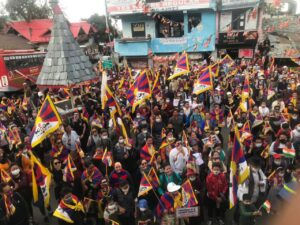
A Tibetan protester during March 10 event in Dharamshala
Photo: Sonam Tsering
Tibetans and supporters across the world marked the 62nd Tibetan National Uprising Day on March 10 by organising peace marches, protests, events and functions. The day marks the 62 years since the Chinese invasion of Tibet and the Tibetans’ struggle against the Chinese regime. In 1959, on March 10, thousands of Tibetans took to street of Lhasa to protest; the protest was crushed and thousands of Tibetans lost their lives.
On this day the Tibetan diaspora and the Tibetan government-in-exile – also known as the Central Tibetan Administration (CTA) – remember the sacrifices made by Tibetans and express solidarity with Tibetans living in Tibet under the repressive policies of the Chinese government. Speaking at the CTA’s official function this year, Sikyong Lobsang Sangay, President of the CTA, said, “Over a million Tibetans have lost their lives in the past six decades under Chinese rule. Today, we have come together to collectively mourn this loss. But we are also here to mark the undaunted resilience of Tibetans in Tibet. Even under the threat of losing their lives, they continue to protest by protecting and preserving our language, our religion, our land, and our identity”.

Tibetans in Dharamshala
Photo: Contact
In Dharamshala, Tibetan non-government organisations (NGOs) were joined by hundreds for the annual peace march from McLeod Ganj to Khajari below lower Dharamshala.
Fifty Tibetan Youth Congress members stormed the Chinese embassy in Delhi; they were detained briefly and later released.
Tenzin Tsundue, the writer and activist, concluded his 500km solo “Walk a Mile for Tibet”march from Dharamshala to Delhi by joining the Uprising Day event in Majnukatilla, the Tibetan settlement in New Delhi. His march, which gained extensive press coverage in the Indian media, raised awareness among Indians of the significance of Tibet in the India-China conflict, his message also called on the government of India to repeal their *One-China policy.
 Government leaders around the world have voiced their support and solidarity for the Tibetan people. From the United States Nancy Pelosi, the House Speaker, and other members of the Congress expressed their support on the occasion of the 62nd Tibetan National Uprising day. “Today, we continue to stand with the Tibetan people and honour those who sacrificed all for their rights and freedom,” said Pelosi in a written statement. She continued, saying that the Beijing for decades has waged a campaign to “destroy Tibet’s proud culture and history”.
Government leaders around the world have voiced their support and solidarity for the Tibetan people. From the United States Nancy Pelosi, the House Speaker, and other members of the Congress expressed their support on the occasion of the 62nd Tibetan National Uprising day. “Today, we continue to stand with the Tibetan people and honour those who sacrificed all for their rights and freedom,” said Pelosi in a written statement. She continued, saying that the Beijing for decades has waged a campaign to “destroy Tibet’s proud culture and history”.
Other leaders, including Mikulas Peksa, President of the Tibet Interest Group of the European Parliament, and Samuel Cogolati, Vice Chair of the Vommittee of Foreign Affairs at the Belgian Parliament have also spoken up in support of the Tibetan movement.
The CTA reports that Uprising Day was observed in 16 cities in eight countries across Central and Eastern Europe, ceremonies included flag raising and public statements by leaders and politicians.
Protest events and rallies were also carried out in cities in Canada, the United States, the United Kingdom, Europe, Taiwan, Belgium, Australia, Switzerland and France.
*According to Wikipedia, One-China policy is a policy asserting that there is only one sovereign state under the name China, as opposed to the idea that there are two states, the People’s Republic of China (PRC) and the Republic of China (ROC), whose official names incorporate “China”.




 Print
Print Email
Email